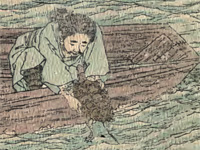You must understand that the general public did not know, at that time, that time-travel was being investigated. It was not an expensive project as long as it was a matter of working on theory, but experimental work had punished the budget and was bound to punish it still more. This was most uncomfortable for scientists engaged in an endeavor that seemed totally “blue-sky.”
William F. Wu, Isaac Asimov’s Robots in Time 1: Predator, 1993
This Sunday supplement article, now nearly six weeks old and smelling pungently of shed and woodbox, quoted two local psychiatrists who had been perfectly happy to blue-sky the situation as long as their names weren’t printed. One of them mentioned a particular sexual aberration – the urge to commit some violent act at the moment of orgasm. Nice, Johnny thought, grimacing. He strangled them to death as he came. His headache was getting worse all the time.
Stephen King, The Dead Zone, 1979
“You’re right, of course,” Glen muttered, and ran a hand over his sandpapery cheek. “Harold, I apologize. I’m very upset. I knew this sort of thing could happen ー pardon me, would happen ー but I guess I only knew it in an academic way. This is a lot different than sitting in the old study, blue-skying things.”
Stephen King, The Stand, 1978
This is why some of the world’s biggest and most tough-minded corporations, once the living embodiment of presentism, today hire intuitive futurists, science fiction writers and visionaries as consultants. A gigantic European chemical company employs a futurist who combines a scientific background with training as a theologian. An American communications empire engages a future-minded social critic. A glass manufacturer searches for a science fiction writer to imagine the possible corporate forms of the future. Companies turn to these “blue-skyers” and “wild birds” not for scientific forecasts of probabilities, but for mind-stretching speculation about possibilities.
Alvin Toffler, Future Shock, 1970
 陸亀が tortoise で海亀が turtle、というふうに明確に二分されているなら、浦島太郎が助けた亀は turtle であって、tortoise と書けば、その答案は×になるだろう。
陸亀が tortoise で海亀が turtle、というふうに明確に二分されているなら、浦島太郎が助けた亀は turtle であって、tortoise と書けば、その答案は×になるだろう。